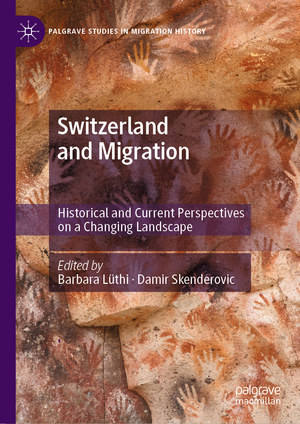Switzerland and Migration: Historical and Current Perspectives on a Changing Landscape: Palgrave Studies in Migration History
Editat de Barbara Lüthi, Damir Skenderovicen Limba Engleză Hardback – 10 mai 2019
Preț: 534.04 lei
Preț vechi: 628.28 lei
-15% Nou
Puncte Express: 801
Preț estimativ în valută:
102.18€ • 106.70$ • 84.38£
102.18€ • 106.70$ • 84.38£
Carte tipărită la comandă
Livrare economică 15-29 aprilie
Preluare comenzi: 021 569.72.76
Specificații
ISBN-13: 9783319942469
ISBN-10: 3319942468
Pagini: 223
Ilustrații: XV, 357 p. 14 illus., 9 illus. in color.
Dimensiuni: 148 x 210 x 23 mm
Greutate: 0.6 kg
Ediția:1st ed. 2019
Editura: Springer International Publishing
Colecția Palgrave Macmillan
Seria Palgrave Studies in Migration History
Locul publicării:Cham, Switzerland
ISBN-10: 3319942468
Pagini: 223
Ilustrații: XV, 357 p. 14 illus., 9 illus. in color.
Dimensiuni: 148 x 210 x 23 mm
Greutate: 0.6 kg
Ediția:1st ed. 2019
Editura: Springer International Publishing
Colecția Palgrave Macmillan
Seria Palgrave Studies in Migration History
Locul publicării:Cham, Switzerland
Cuprins
Changing Perspectives on Migration History and Research in Switzerland: An Introduction; Barbara Lüthi and Damir Skenderovic.- Part I: Epistemic Landscapes: Constructing and Deconstructing Categories.- The ‘Sociologic’ of Immigration. A Case Study on the Emergence of Social Research on Migration and Integration in Switzerland, 1960–1973; Kijan Espahangizi.- Labelling Migrants in Switzerland: Social, Political and Symbolic Dimensions; Francesca Poglia Mileti.- Democratising Switzerland: Challenging Whiteness in Public Space; Patricia Purtschert.- Part II: Migration Regimes: Enforcement and Consolidation.- Deportations of ‘Vagabonds’ and ‘Romanichas’ in Geneva and Haute-Savoie (1900-1914): Connecting Categories of Exclusion; Irma Gadient.- Migration in Swiss Broadcasting (1960s-1970s): Players, Policies, Representations; Nelly Valsangiacomo.- Culturalisation of Gender: When Ivan Meets Maria; Francesco Garufo and Christelle Maire.- The Vitality of Borders: Migration Through and Bordering Practices in Switzerland; Jana Häberlein.- Part III: Migrants’ Participation and Resistance.- Migrant Associations: Political Opportunities and Structural Ambivalences. The Case of the Federation of Free Italian Colonies in Switzerland; Toni Ricciardi and Sandro Cattacin.- The Rights of Those Who Have No Rights. Italian Parent Committees in Local Educational Politics in Zurich (1960-1980); Philipp Eigenmann.- Social Assistance and Self-Organised Interest Groups. The Counselling Centre for Foreign Workers and Italian Educational Institutions in Basle-City (1960s-1980s); Flavia Grossmann.- Part IV: Transnational Entanglements and Exchanges .- Traces of Migration: Postcards Between Switzerland and Brazil, 1900–1930; Stefan Wellgraf.- Switzerland, Decolonisation, and Migration: The Case of the Association of Swiss Despoiled of Algeria or Overseas Possessions; Marisa Fois.- ‘Swissness Overseas’: Whiteness and the Boundaries of Belonging; Angela Sanders.-Re-negotiating Switzerland from Abroad. An Ethnographic Perspective on Citizenship-Belonging Nexuses; Seraina Müller and Aldina Camenisch.- Epilogue; Donna Gabaccia.
Notă biografică
Barbara Lüthi is Assistant Professor in the History Department, University of Cologne, Germany’. She was a Visiting Scholar at UC Santa Barbara, the University of Chicago, and at UC Davis. Together with Patricia Purtschert and Francesca Falk, she has co-edited the volume Postkoloniale Schweiz: Formen und Folgen eines Kolonialismus ohne Kolonien (2012, 2nd edition 2013), and with William Walters a special issue on politics and mobility for the International Journal of Politics, Culture, and Society.
Damir Skenderovic is Professor of Contemporary History at the University of Fribourg, Switzerland. He was a Visiting Scholar at the Center for European Studies at New York University, the Berlin Social Science Center, and the Department of History at UC Irvine. He is author of The Radical Right in Switzerland (2009) and with Irma Gadient co-editor of a special issue on Migration History for the Swiss Journal of History(2015).
Damir Skenderovic is Professor of Contemporary History at the University of Fribourg, Switzerland. He was a Visiting Scholar at the Center for European Studies at New York University, the Berlin Social Science Center, and the Department of History at UC Irvine. He is author of The Radical Right in Switzerland (2009) and with Irma Gadient co-editor of a special issue on Migration History for the Swiss Journal of History(2015).
Textul de pe ultima copertă
This book explores the history of migration in Switzerland from the late nineteenth century to the present day. It brings together recent scholarship on Switzerland in the field of cultural and migration studies, as well as migration history, and combines various research approaches from postcolonial studies, transnational studies, border studies, and history of knowledge. Since the late nineteenth century, Switzerland has gradually transformed into a migration society, becoming one of the countries in Europe with the highest percentage of migrant population. While migration has become one of most contentious issues in Swiss public and political debates, the volume also shows how migrants have developed various strategies to deal with the country’s discriminatory policies and distinct institutional settings. The authors of the volume convincingly challenge the view that Switzerland still does not represent a migration (or even post-migrant) society and substantially contributes to the long overdue acknowledgement of Switzerland in migration history and studies at the international level.
Caracteristici
Explores the relationship between migration, power and agency in one of the countries with the highest migrant population in Europe Brings together historians, sociologists, anthropologists and cultural studies scholars to offer new perspectives on historical experiences and legacies of migration Takes a transnational and comparative approach to migration history














